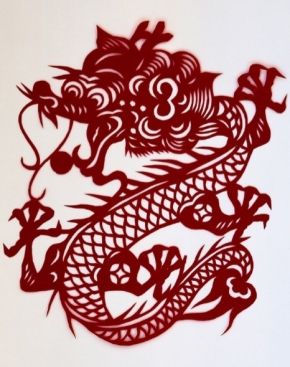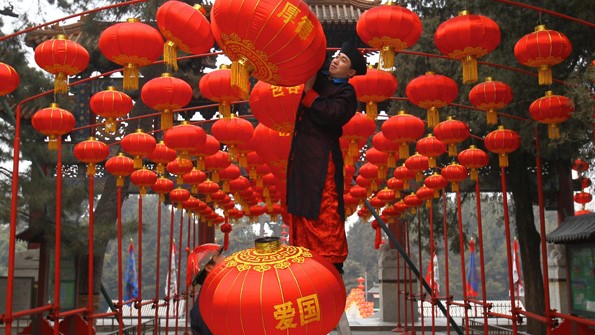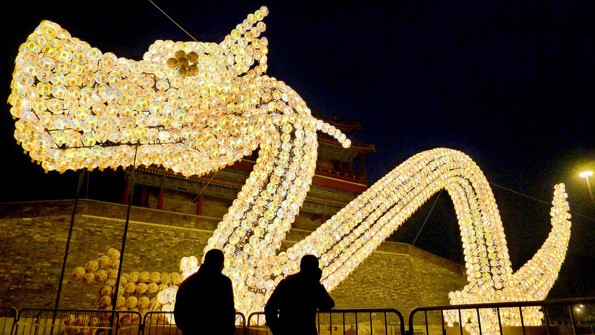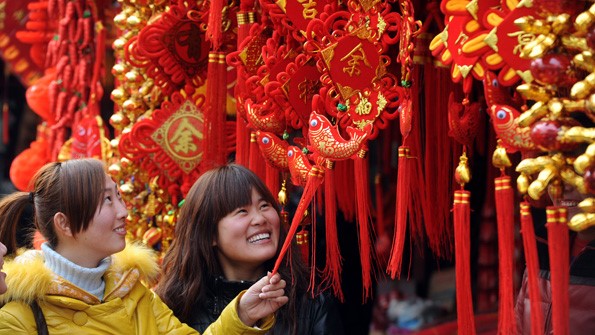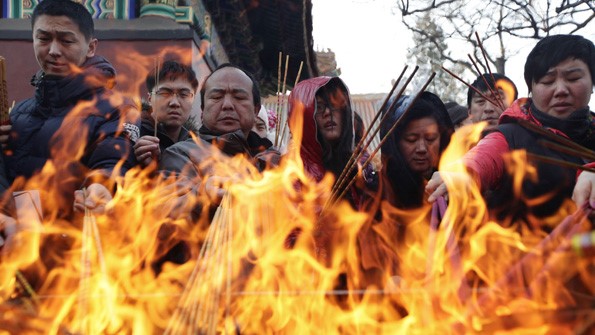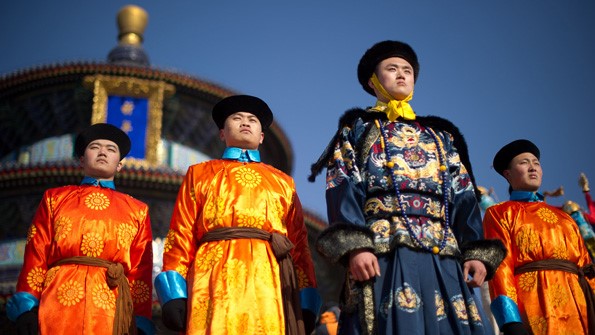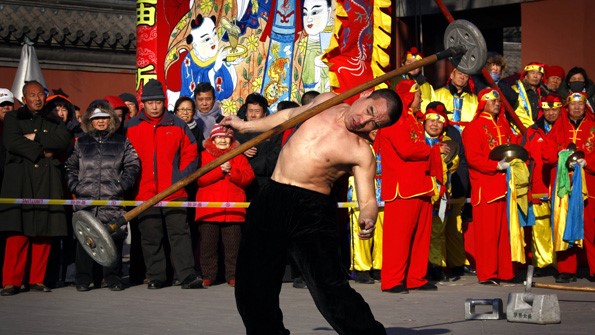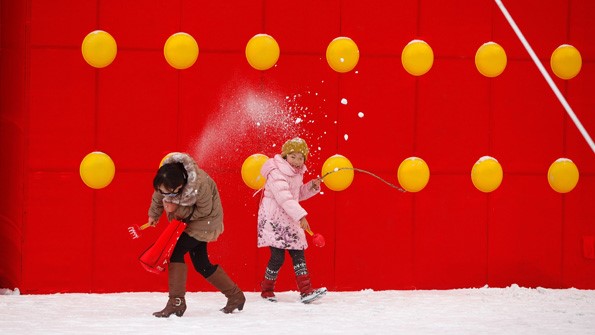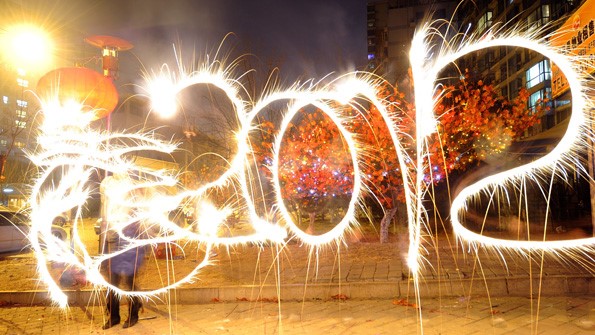

 字體:小 中 大
字體:小 中 大 |
|
|
|
| 2018/03/10 18:57:36瀏覽37|回應0|推薦0 | |
Competition (省略圖)Help us name our new China blogJan 24th 2012, 18:20 by The Economist online
恭喜發財! 龍馬精神! READERS are invited to suggest a name for our new blog on all things to do with China, which will be launched in February. It will cover politics big and small, from the tea leaves of Zhongnanhai to the hillside prefectures of the Wuyishan, business and economics on every scale, pop culture, historiography, the odd travelogue, and lots in between. This leaves a lot of range as far as the blog's name goes (it doesn't need to begin with "B", or refer to a tree). Ideally it will accord with the style and 19th-century origins of The Economist. Please enter your proposed name in the comment thread below. We await your suggestions with interest. Our forthcoming China blog Jan 31st 2012, 18:02
The proposed name is “Xanadu”.
Because of the range of what you Economist puts forward, “the tea leaves of Zhongnanhai” in Beijing with “Wuyishan” in Fujian province, the name of new China blog may be in accordance with not only “new China 2.0” but also the symbol of contemporary China.
According to most of predict, China can keep this shengshi (prosperity phonetic in Chinese) in at least three generations of offsprings. In Chinese history, there were some shengshi for several times, including Qin-Han’s in B.C.221-A.D.220, Sui-Tang’s in A.D.618-A.D.902, Yuan’s in 1279-1294 and Qing’s in 1662-1799.
From my first glance at shueisha’s Chinese briefing history to the present time, Mongol Empire is the most admirable, referring to Yuan’s big dynasty while Kublai Khan and his followings were chanting the victory for the establishment of world empire. In China, Kublai’s reign was a period of peace, commercial prosperity, religious tolerance (he converted to Buddhist), and a cultural flowering. Kublai decided to move the capital to Xanadu (where Beijing nowadays locates), which became the pronounce and was depicted in numerous businessmen or poets (like Marco Polo) as the heaven of the contemporary world. The free trade was prevailing for the examine station which functioned as the guarantee of safety in his expanding territory. The following scenario (line 1-5, Kubla Khan poem by Samuel Taylor Coleridge) really expresses the rich and joy of Kublai’s reign:
In Xanadu did Kubla Khan A stately pleasure-dome decree : Where Alph, the sacred river, ran Through caverns measureless to man Down to a sunless sea.
As the sayings of Professor Wu Jing-lian, China is the only country that experiences “the circle from prosperity to decline” and can happen “recover from the decline to the prosperity”. China’s second peaceful transition of regime may happen in these two years. By my logistics of Yin-yang (the circle of sun-moon), the next President Xi Jin-ping is the reincarnation of Kublai Khan, also the embodiment of phoenix with his wife Peng Li-yuan. Coincidentally and auspiciously, Xi was also once the Fujian governor whose princeling party has been managing and controlling the east-southern coast of China for at least thirty years. Xi’s story, from youth to the present, contains “the tea leaves of Zhongnanhai” in Beijing as well as “Wuyishan” in Fujian and your sayings “business and economics on every scale, pop culture, historiography, the odd travelogue, and lots in between”. Beyond question, “Xanadu”, which can contain and infer the most of China’s concern, is the best choice of the new blog’s name.
p.s. so warmful for your late simplfied Chinese. Ha. Ha. Ha!
Recommended 11 Report Permalink 這裡是筆者投稿讓經濟學人從各網友意見中,選擇當年即將開設的中國專欄的標題。就像當年亞洲欄使用Banyan「榕樹」,最後是Analect「論語」獲選。考慮其給定中南海的茶葉,讓筆者聯想起武夷山看著改革開放的民族復興,一晃眼一代有餘了,當年可有百年盛世的一舉。但是今天中共完成修憲後,當年剛成為亞洲第一大經濟體的能力,不知習近平是否真有中國夢的相伴,無論其是否有此龍命在身,先說這九千萬黨員是否真有同一條心呢?而這導致政改和政變都變得更近、更真實了是吧?筆者當年真高興的寫仙那度,算到不知過頭了的對極了而今日看來真是諷刺,會不會富不過三代的問題就落到中共現行體制上了。提及中國經濟的壯大,富麗堂皇的北京看著就要恢復歷代中國古代帝國的榮景,筆者還引用吳敬璉博士的著作內所提:中國是世界上唯一一個例子有過由盛轉衰,而後又衰轉盛的經濟體。 Xanadu「仙那度」在這裡一般猜想是上都和林,也有認為首都大都即今天的北京; 也有作忽必烈汗的一切統領範圍,總之象徵著帝制中華最大領土範圍時期的強盛。仙那度最有名即御林苑,有北方牧草及宮殿,使自己不忘本,不被奢華浮靡消沉意志。在1980年當作一部愛情電影標題及如2000年的熱門電影The Family Man 「扭轉奇蹟」裡面就有一句 "Welcome To Xanadu"穿插在電影裡面。根據Merriam-Webster Collegiate Dictionary 2003版的查詢,"Xanadu", locality in Kubla Khan (1798), poem by Samuel T. Coleridge, DATE 1919: an idyllic, exotic, or luxurious place. 有歡愉、簡潔自然,而外向又頂級奢侈的所在。原詩摘自1797所作而1816出版的"Kubla Khan; or, A Vision in a Dream: A Fragment",現在錄下全部原作原文: Then all the charm In Xanadu did Kubla Khan A stately pleasure-dome decree : Where Alph, the sacred river, ran Through caverns measureless to man Down to a sunless sea. (lines 1–5)
So twice five miles of fertile ground With walls and towers were girdled round: And there were gardens bright with sinuous rills, Where blossomed many an incense-bearing tree; And here were forests ancient as the hills, Enfolding sunny spots of greenery. (lines 6–11)
And there were gardens bright with sinuous rills, (1816版本有)
And here were gardens bright with sinuous rills, (1816版本有)
But oh! that deep romantic chasm which slanted Down the green hill athwart a cedarn cover! A savage place! as holy and enchanted As e'er beneath a waning moon was haunted By woman wailing for her demon-lover! (lines 12–16)
And from this chasm, with ceaseless turmoil seething, As if this earth in fast thick pants were breathing, A mighty fountain momently was forced: Amid whose swift half-intermitted burst Huge fragments vaulted like rebounding hail, Or chaffy grain beneath the thresher's flail: And 'mid these dancing rocks at once and ever It flung up momently the sacred river. Five miles meandering with a mazy motion Through wood and dale the sacred river ran, Then reached the caverns measureless to man, And sank in tumult to a lifeless ocean: (lines 17–28)
And 'mid this tumult Kubla heard from far Ancestral voices prophesying war! (lines 29–30)
The shadow of the dome of pleasure Floated midway on the waves; Where was heard the mingled measure From the fountain and the caves. It was a miracle of rare device, A sunny pleasure-dome with caves of ice! (lines 31–36)
A damsel with a dulcimer In a vision once I saw: It was an Abyssinian maid, And on her dulcimer she played, Singing of Mount Abora. Could I revive within me Her symphony and song, To such a deep delight 'twould win me, That with music loud and long, I would build that dome in air, That sunny dome! those caves of ice! (lines 37–47)
And all who heard should see them there, And all should cry, Beware! Beware! His flashing eyes, his floating hair! Weave a circle round him thrice, And close your eyes with holy dread, For he on honey-dew hath fed, And drunk the milk of Paradise. (lines 48–54)
柯爾律治《忽必烈汗》重譯 傅正明譯 忽必烈汗︰或夢中的一個幻象。一段殘詩 (Kubla Khan: Or, a Vision in a Dream• A Fragment)[1] 刊行這段殘詩,實乃應一位當之無愧的偉大詩人(拜倫爵士)的請求。就作者本人的觀點而言,與其說它富于何種潛在的詩意,倒不如說它可以視為一份珍貴的心理學資料。 1797年夏,健康欠佳的作者,回到薩默塞特郡與德文郡的埃克摩邊界地帶波羅克與林東之間孤獨的農舍。他因身體不適服用了一點鎮痛劑,藥性發作之後,睡眼朦朧中讀到普卡斯 (Purchas ) 的《朝聖》( Pilgrimage )︰“忽必烈汗詔令營造宮殿,修建御花園,十里沃野被高牆圍隔。”不知不覺沉沉入睡約三小時,當此外部感覺最少之時,他最明確地相信自己可以寫作--至少能寫兩三百行詩,如果這真能稱為寫作的話。在這一過程中,所有的意象像事物一樣在他眼前浮上來,有一種與表現相應的類似的創造,沒有任何苦心經營的感覺或意識。醒來時,他尚有完整而清晰的回憶。他取出筆墨紙張,立即奮筆疾書,寫下這些詩行。此刻,他不幸被一個從波羅克來的辦事員叫出來,耽擱了一個多小時。回到書房後,他十分驚異而沮喪地發現,盡管他仍然模糊地記得幻景的大致內容,卻僅僅寫下散亂的八到十行殘詩和意象,其余的就像一石擊破溪流之後,水面的意象消失得無影無蹤,而且再也無法復原了! 迷人之境 皆被弄碎 美不勝收的魔幻世界 化為烏有,一千只圓環展開, 一只只遞相扭曲變形。略停片刻, 可憐啊青年!你簡直未敢抬起眼楮 -- 溪流將很快恢復它的光滑,很快 幻景將重現!啊,他停下來, 很快,可愛的形式模糊的殘片 顫抖著回歸,聯結,現在 小池再度成為一面明鏡。 ( 摘自柯爾律治<圖畫,或,情人的決心>,第91-100行) 但是,從依舊殘留于他心中的回憶,作者已多次想為他自己完成在靈啟中得到原初意象。“明天我將給你唱首更甜美的歌”:[2] 明天還會來的。作為這個幻景的一個對比,我附錄了一個特色頗為不同的殘篇,以同樣的忠實來描繪這個痛苦的病態的夢。 忽必烈汗立上都, 詔令建造金碧輝煌安樂宮。 神河阿爾佛[3],訇然穿岩洞, 奔流直下,深不可測, 匯入不見天日地下海洋中。 方圓十哩,一片沃野, 樓台亭閣,輔以城闋。 溪流穿花園,蜿蜒閃光澤, 溪邊植香木,鮮花開不謝; 四山拱衛壽比丘壑林間樹 環抱明媚大草地,一片青蔥色。
上有濃蔭覆蓋之杉樹,下有幽深莫測之罅隙。 其險也如此,其神也難說 但聞寒月下,神出鬼沒一女郎 只緣情人化魔怪,淚汪汪。 又聞罅隙一片喧囂翻波浪。 仿佛大地垂危間,氣喘喘。 一股地泉,洶涌噴射, 巨石碎沙,騰上雲天, 或如列缺霹靂之中冰雹之倒落, 或如農夫連枷之下稻谷之反彈。 龐然大岩石,飛舞何蹁躚! 神河夾石出深淵,倒流上青山, 流過峽谷,流過森林, 迷迷茫茫,蜿蜒五哩長, 直入深不可測岩洞間, 一片喧囂沉入死寂大海洋。 喧囂間,忽必列汗遙聞祖先 吐真言,預言一場大惡戰。
雕梁畫棟之殿堂, 水中倒影泛波瀾; 悲喜交加之曲調 來自岩洞和地泉。 其乎怪哉!鬼斧神工為世所罕見, 陽光映照逍遙宮,閃爍冰窟雪窖間!
憶昔朦朧生幻象, 飄然飛來一女郎, 自言本為異邦女,[4] 蝴蝶古琴[5] 抱身上, 為我一揮手,仙山 [6] 飄絕響。 婉轉歌喉,從此不再聞, 和諧音韻,而今在何方? 若能摹寫銷魂之仙曲, 定能以樂音之悠遠高揚, 重建霧里樓台,雲中仙邦, 陽光燦爛安樂宮,聳立冰窟雪窖上! 如此海外奇談,凡能耳聞目睹者, 定然高聲呼喊︰提防!提防! 他那眼光閃亮,他那發絲飄蕩! 織一圓環,繞他三匝,只緣他以人間蜜露為食, 以天國乳泉為漿。 1798年
譯注 [1] 譯自柯爾律治的《克麗斯特貝爾》(Christabel, 1816)。 [2] 原文為希臘文,引自古希臘詩人特俄克里特 ( Theocritus ) 的《牧歌》( Idylls I. 145 )。 [3] 詩人想象中的一條河流。 [4] 原文為阿爾比西尼亞 ( 埃塞俄比亞舊稱 ) 姑娘。 [5] 或音譯為德西瑪琴, 一種以小錘敲擊、類似于中國揚琴的樂器。 [6] 原文為阿拉伯山,詩人想象中的一座仙山。 (摘自萬維讀者網:http://bbs.creaders.net/poem/bbsviewer.php?trd_id=555590&language=big5)「As the sayings of Professor Wu Jing-lian, China is the only country that experiences “the circle from prosperity to decline” and can happen “recover from the decline to the prosperity”.」這句有中式英語問題,happan那個子句造錯了,改成 reverse into。整句應該是「According to the lifelong study by Dr Wu Jing-lian, China is the only country that experience the round from prosperity to decline and then "reverse into a incredibly great wealth."就是中國胡錦濤前主席有時在國際場合所提的shengshi盛世。 *附2012年經濟學者雜誌所紀錄的中國各地的壬辰龍年,時值胡錦濤任國家主席最後一年,經濟民生快速發展,盛世的恢復在都會區與硬體方面取得一些突破,在2008北京奧運和2010上海世界博覽會成功後全力進化轉型,這年的中國尚稱平實如意,河清海晏的一年,沒有電影「2012」的場景出現:
Raising a patriotic red lantern in Beijing’s Summer Palace
The dragon is supposed to be the luckiest of China’s 12 zodiacal symbols. This one is made up from 3,000 lanterns
Many millions of travellers crowd onto public transport for the week-long celebration. Some fraction of them appear in this picture, from Chengdu
Shopping for decorations in Anhui province. Fish and pairs of fish are auspicious markers of the new year
Burning incense in prayers of good fortune, in Beijing
Performers dressed in the style of the Qing dynasty take part in a public act of worship in Beijing
A strongman twirls weights for spectators outside a Taoist temple
It’s snowy in Lanzhou, but symbolically the new year’s arrival marks the onset of springtime
That’s “dragon”, drawn in sparklers to the left, and “2012” for the rest of the world Domonic Ziegler / Rob Gifford |
|
| ( 心情隨筆|心情日記 ) |




